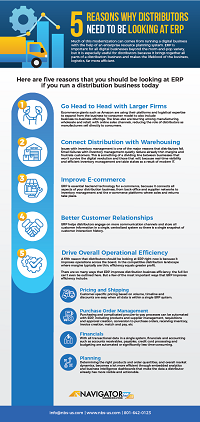
Why Distributors Should be Looking at ERP
Disruption is happening all over the world right now, from business to politics. This is no less true for distributors, who face online marketplaces, more direct-to-consumer sales by manufacturers, and real-time data that is changing the competitive landscape.
The digital shakeup doesn’t pose an existential threat for distributors like it has for the newspaper industry, but it does require some thoughtful adjustment. The biggest adjustment is modernizing technology so distributors aren’t left behind.
Much of this modernization can come from running a digital business with the help of an enterprise resource planning system. ERP is important for all digital businesses beyond the mom-and-pop variety, but it is especially useful for distributors because it brings together all parts of a distribution business and makes the lifeblood of the business, logistics, far more efficient.
Download the Infographic: 5 Reasons Why Distributors Need to be Looking at ERP
Here are five reasons that you should be looking at ERP if you run a distribution business today.
1. Go Head to Head with Larger Firms
E-commerce giants such as Amazon are using their platforms and logistical expertise to expand from the business-to-consumer model to also include business-to-business offerings. The lines also are blurring among manufacturing, wholesale, and retail, with online sales channels, reducing the role of distributors as manufacturers sell directly to consumers.
Distributors are going up against much larger firms that have sophisticated real-time processes that largely are automated, and strategic advantages such as advanced analytics and artificial intelligence.
ERP levels-up distributors for this new landscape by giving them a comprehensive, modern backend infrastructure that allows them to do the same things as the larger firms even if the scale of their business is not as large. Cloud-based ERP solutions such as SAP Business ByDesign include almost all of the same functionality as the ERP systems these Fortune 500 businesses use because these ERP solutions are made by the same company that makes the systems that larger businesses are using.
But because the cloud is scalable, distributors don’t have to pay the large enterprise price tag for the tools they need.
2. Connect Distribution with Warehousing
Issues with inventory management are one of the major reasons that distributors fail. Small failures with inventory management quietly reduce already thin margins and frustrate customers. This is something of a dividing line between businesses that won’t survive the digital revolution and those that will because real-time visibility and efficient inventory management are table stakes as a result of modern IT.
Cloud-based ERP helps distributors directly connect manufacturer systems, warehouses, and online marketplaces for total visibility, automated real-time fulfillment, and better coordination. Connecting your warehouse management system to ERP also helps reduce the pain point of having multiple systems and inaccuracies, and it streamlines business processes by showing detailed historical and real-time information that can be used for strategic and tactical planning.
3. Improve E-commerce
Online sales, whether through e-commerce marketplaces or directly on your site, is both the present and the future. Yet legacy systems aren’t optimized for the e-commerce landscape, with paper processes and a hodgepodge of disconnected systems even less so.
ERP is essential backend technology for e-commerce, because it connects all aspects of your distribution business, from back-office and supplier networks to inventory management and the e-commerce platforms where sales and returns take place.
By having all systems connected through ERP, distributors can automate e-commerce and many of the routine processes that make up a distribution business. This includes ordering, logistics, inventory management, accounting, and fulfillment, among others.
When processes are connected through a unified ERP system, distributors also can offer the e-commerce customer service they now expect, including accessing order history, viewing order status, tracking shipments, modifying orders, and updating shipping and payment information.
4. Better Customer Relationships
Speaking of customer service, ERP also helps your distribution business improve customer contact and issue resolution for longer customer relationships. In today’s business climate where competition is only a few clicks away, customer care is more important than ever.
ERP helps distributors engage on more communication channels and store all customer information in a single, centralized system so there is a single snapshot of customer interaction history.
Another way that ERP improves the customer relationship is by enabling distributors to set up a self-serve customer portal where customers can see up-to-date order information and answers to common questions at any time, much like they do when ordering consumer goods on Amazon.
The customer relationship management component of an ERP system also improves a distributor’s sales process by bringing together all information about a customer or prospect and even suggesting the next-best actions through embedded analytics.
In the customer service war, a unified backend system is an essential kit for meeting the needs and expectations of customers.
5. Drive Overall Operational Efficiency
A fifth reason that distributors should be looking at ERP right now is that it improves operations across the board. In the competitive distribution landscape where margins typically are thin, efficiency equals greater profit.
There are so many ways that ERP improves distribution business efficiency, the full list can’t even be outlined here. But a few of the most important ways that ERP improves efficiency include:
Pricing and Shipping. Customer-specific pricing based on volume, timeline, and discounts is easy when all data is within a single ERP system. Pricing algorithms can make short work of determining the correct price quotes, and shipping accuracy go from best guess to precise dates calculated from real-time logistics data.
Purchase Order Management. Purchasing and complicated procure-to-pay processes can be automated with ERP, including products and supplier management, requisitions and approval creation, conversion to purchase orders, receiving inventory, invoice creation, match and pay, etc. Transactions get a whole lot easier when all data flows into a single system that automates processes based on your business logic.
Financials. With all transactional data in a single system, financials and accounting such as accounts receivables, payables, credit card processing, and budgeting are automated or significantly less time-consuming. Most businesses report shaving off days of work each month just in accounting alone as a result of ERP.
Planning. Determining the right products and order quantities, and overall market dynamics become a lot more efficient through embedded analytics and business intelligence dashboards that make the data a distributor already has more visible and actionable. Reports also can be automated with ERP instead of requiring time in spreadsheets or manual cutting and pasting.
If your distribution business isn’t already using a modern, cloud-based ERP system, you should take a look.
For more on the changing distribution landscape and how ERP can help, download our free guide, Navigator’s Modernization Guide for Wholesale Distributors.


